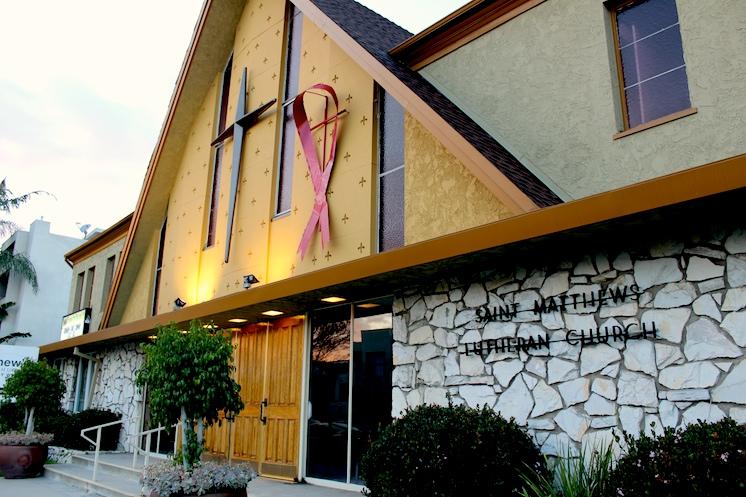With Benedict’s resignation, LGBT Catholic group hopes for change
St. Matthew’s Church in the Los Angeles metropolitan area, a Lutheran church where the parishioners are members of the San Fernando Valley chapter of DignityUSA, the nation’s largest LGBT Catholic organization.
LOS ANGELES — At first glance, the Catholic service held at St. Matthew’s Church is like any other—members of the congregation sing hymns, pray for those in need and send rings of hallelujah throughout the chapel.
But St. Matthew’s is a Lutheran church, not a Catholic one, and the parishioners are members of the San Fernando Valley chapter of DignityUSA, the nation’s largest LGBT Catholic organization that fights for change in the Vatican’s teachings on homosexuality.
“We deserve marriage rights,” says DignityUSA’s executive director, Marianne Duddey-Burke. “The recognition of that commitment is part of the justice structure of our world.”
History stands against the organization’s goals, however; the Catholic Church has traditionally been opposed to same-sex marriage and remains so to this day.
Now that Pope Benedict XVI is set to resign at the end of February, Dignity sees a chance for the Vatican to advance a more accepting stance — and it isn’t alone. Various LGBT groups around the globe came out with similar messages when news of Benedict’s resignation spread.
While few gay Catholics anticipate a significant change in policy with a new pope, they hope Benedict's resignation might lead to an open dialogue and an end to what they call derogatory and discriminatory comments. But even such discussion seems unlikely — one of the top candidates to succeed the pope, Cardinal Peter Turkson of Ghana, has defended criminalizing homosexuality and supported Uganda’s “Kill the Gays” bill.
Like Turkson, Benedict is a staunch critic of homosexuality. He recently called gay and lesbian unions the potential “self-destruction” of the human race. In his 2012 Christmas address to the Vatican, the pope said proponents of gay marriage were destroying the very "essence of the human creature” by foregoing their “God-given gender identities.”
Duddey-Burke says she gives Benedict credit for resigning and putting the needs of the Church first. She adds that there are two central issues the church must address: it needs a pope who can help restore the moral credibility of the church after the recent sex abuse scandals, and one who can heal the divisions that separate the LGBT community from the church.
“Our experience told us same-sex marriage is good and holy,” she says. “We need a pastor with a listening heart.”
Founded in 1969, Dignity began as a “tolerated” member of the Catholic Church. Pope John Paul II called on bishops to expel the group from Catholic churches, social halls, convents and other properties in 1986 for defying the official Catholic teaching that says only sexual relations in the context of heterosexual marriage are valid.
Despite this, the group still identifies as Catholic, and the battle between the church and Dignity continues.
In January, the US Conference of Catholic Bishops filed an amicus curiae, or friend of the court, brief supporting Proposition 8 in an upcoming case contesting the 2008 initiative that stripped LGBT couples of the right to marry in California.
The bishops cited the “unique capacity of opposite-sex couples to procreate” and “the unique value to children of being raised by their mother and father together” as reasons to uphold the proposition.
But recent studies show the Catholic laity increasingly supports gay rights. According to a February Pew Research Center poll, more than half of Catholics support same-sex marriage. When Benedict was elected pope in 2005, that figure was less than 40 percent.
It’s signs like these that give Dignity hope that their work isn’t futile. The group now plans on writing a brief of its own in response to that of the bishops.
“Every living person is a creation of God,” says Duddey-Burke. “It’s impossible to stand for that without being fully who we are.”
In states where marriage is legal, many Dignity chapters have presiders who will perform and certify same-sex marriages, Duddey-Burke adds.
Chris Cappiello, a member of Dignity San Fernando Valley, says the role of the organization has changed over the years. What once was a group that provided solace for those who could not openly practice as gay Catholics is now one that also vigorously works for reform in the church.
“These are our sacraments. These are our traditions. These are our worship rites,” he says. “We're not going to walk away just because of some old guys in Rome.”
Cappiello, who married his partner 10 years ago in British Columbia, says the recent rise in LGBT acceptance helps their cause by pointing to the church as “inhospitable.” He says he believes this sort of attention on the Vatican will cause a change of heart.
“When people talk about ‘gay marriage,’ I like to point out that there is no such thing,” he says. “There is only marriage and the question of who is allowed access to that.”
Sarah Parvini is a journalist living in Los Angeles. She is currently a Master's candidate in digital journalism at the Annenberg School for Communication and Journalism.
Every day, reporters and producers at The World are hard at work bringing you human-centered news from across the globe. But we can’t do it without you. We need your support to ensure we can continue this work for another year.
Make a gift today, and you’ll help us unlock a matching gift of $67,000!
